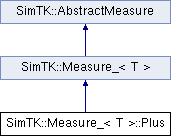SimTK::Measure_< T >::Plus Class Reference
This Measure is the sum of two Measures of the same type T. More...
 Inheritance diagram for SimTK::Measure_< T >::Plus:
Inheritance diagram for SimTK::Measure_< T >::Plus:Classes | |
| class | Implementation |
Public Member Functions | |
| SimTK_MEASURE_HANDLE_PREAMBLE (Plus, Measure_< T >) | |
| Plus (Subsystem &sub, const Measure_< T > &left, const Measure_< T > &right) | |
| SimTK_MEASURE_HANDLE_POSTSCRIPT (Plus, Measure_< T >) | |
 Public Member Functions inherited from SimTK::Measure_< T > Public Member Functions inherited from SimTK::Measure_< T > | |
| SimTK_MEASURE_HANDLE_PREAMBLE_ABSTRACT (Measure_, AbstractMeasure) | |
| This class is still abstract so we don't want it to allocate an Implementation object in its default constructor. More... | |
| const T & | getValue (const State &s, int derivOrder=0) const |
| Retrieve the Value of this Measure or one of its time derivatives, assuming the supplied State has been realized to at least the required stage for the selected value or derivative, as reported by getDependsOnStage(). More... | |
| Measure_ & | setDefaultValue (const T &defaultValue) |
| Change the default value associated with this Measure. More... | |
| const T & | getDefaultValue () const |
| Obtain a reference to the default value associated with this Measure. More... | |
| SimTK_MEASURE_HANDLE_POSTSCRIPT (Measure_, AbstractMeasure) | |
 Public Member Functions inherited from SimTK::AbstractMeasure Public Member Functions inherited from SimTK::AbstractMeasure | |
| AbstractMeasure (Implementation *g=0) | |
| Provide an Implementation for this AbstractMeasure and bump its reference count. More... | |
| AbstractMeasure (Subsystem &, Implementation *g, const SetHandle &) | |
| Construct this handle with a given Implementation object (whose reference count will be bumped) and then let the given Subsystem adopt this Measure (which will again bump the Implementation's reference count, leaving us with two new handles). More... | |
| AbstractMeasure (const AbstractMeasure &) | |
| Shallow copy constructor copies the pointer from the source Implementation object and bumps its reference count. More... | |
| AbstractMeasure & | operator= (const AbstractMeasure &source) |
| Shallow assignment operator results in this handle referencing the same Implementation object as does the source. More... | |
| ~AbstractMeasure () | |
| Destructor decrements the Implementation's reference count and deletes the object if the count goes to zero. More... | |
| AbstractMeasure & | shallowAssign (const AbstractMeasure &) |
| Shallow assignment operator destructs the current Implementation object (meaning its reference count is decremented and the object actually deleted only if the count goes to zero), then copies the Implementation pointer from the source and bumps its reference count. More... | |
| AbstractMeasure & | deepAssign (const AbstractMeasure &source) |
| Deep assignment clones the Implementation object pointed to by the source handle, so that this handle ends up pointing to a new Measure object similar to the original but not yet contained in any Subsystem. More... | |
| int | getNumTimeDerivatives () const |
| Every Measure can produce a value, and some can provide one or more total derivatives with respect to time of that value. More... | |
| Stage | getDependsOnStage (int derivOrder=0) const |
| At what Stage can we expect the value of this AbstractMeasure or one of its time derivatives to be available? Users of Measures will typically impose restrictions on the levels they will accept. More... | |
| bool | isSameMeasure (const AbstractMeasure &other) const |
| There can be multiple handles on the same Measure. More... | |
| bool | isEmptyHandle () const |
| bool | isInSubsystem () const |
| Test whether this Measure object has been adopted by a Subsystem. More... | |
| const Subsystem & | getSubsystem () const |
| Return a reference to the Subsystem that owns this Measure. More... | |
| bool | isSameSubsystem (const Subsystem &) const |
| Is getSubsystem() the same as the passed-in Subsystem? More... | |
| MeasureIndex | getSubsystemMeasureIndex () const |
| Return the MeasureIndex by which this Measure is known to the Subsystem that owns it. More... | |
| const Implementation & | getImpl () const |
| Implementation & | updImpl () |
| bool | hasImpl () const |
| int | getRefCount () const |
Detailed Description
template<class T>
class SimTK::Measure_< T >::Plus
This Measure is the sum of two Measures of the same type T.
- Template Parameters
-
T Any type that supports a plus operator that returns a sum as another object of type T. In particular, Real, Vec<N>, and Vector will work.
Constructor & Destructor Documentation
◆ Plus()
template<class T>
|
inline |
Member Function Documentation
◆ SimTK_MEASURE_HANDLE_PREAMBLE()
template<class T>
| SimTK::Measure_< T >::Plus::SimTK_MEASURE_HANDLE_PREAMBLE | ( | Plus | , |
| Measure_< T > | |||
| ) |
◆ SimTK_MEASURE_HANDLE_POSTSCRIPT()
template<class T>
| SimTK::Measure_< T >::Plus::SimTK_MEASURE_HANDLE_POSTSCRIPT | ( | Plus | , |
| Measure_< T > | |||
| ) |
The documentation for this class was generated from the following file:

